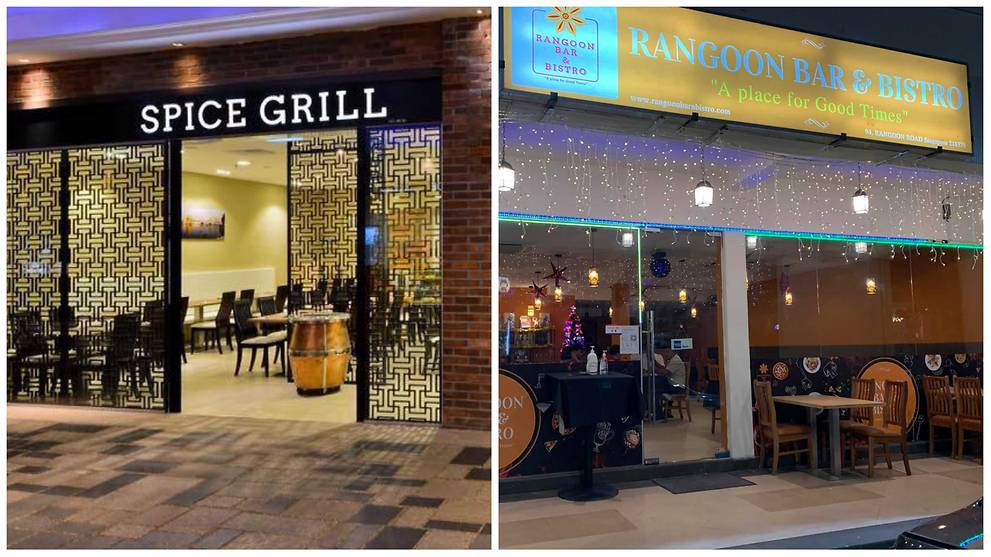- Joined
- Mar 31, 2020
- Messages
- 9,153
- Points
- 113
Singapore's sole COVID-19 community case is a restaurant manager at 2 eateries; wife tested positive last week

Case 62143 is a restaurant manager at Spice Grill Restaurant (left) and Rangoon Bar & Bistro (right). (Photos: Facebook/Spice Grill Singapore)
19 Apr 2021 11:43PM (Updated: 19 Apr 2021 11:50PM)
SINGAPORE: The only new COVID-19 community case reported in Singapore on Monday (Apr 19) is a 44-year-old man who works as a restaurant manager at two eateries, said the Ministry of Health (MOH).
The Singapore permanent resident is among the 20 new COVID-19 cases reported in Singapore, according to MOH's daily update.
Identified as Case 62143, the man is the spouse of Case 62045, a 41-year-old woman, and was identified as a close contact and placed on home quarantine on Apr 16.
The man works at Spice Grill Restaurant in the Icon Village mall at 12 Gopeng Street, as well as Rangoon Bar & Bistro at 94 Rangoon Road. He visited both restaurants several times during his infectious period, with Apr 15 being his last day of work.
 List of public places visited by cases in the community during their infectious period. (Image: Ministry of Health)
List of public places visited by cases in the community during their infectious period. (Image: Ministry of Health)
The man was tested for COVID-19 during quarantine on Apr 17. His test came back positive on Apr 18, and he was taken to the National Centre for Infectious Diseases (NCID). He is asymptomatic.
His serology test has come back negative, indicating that this is likely a current infection.
"Epidemiological investigations are ongoing," MOH said.
"In the meantime, all the identified close contacts of (Case 62143), including his co-workers, have been isolated and placed on quarantine, and will be tested at the start and end of their quarantine period so that we can detect asymptomatic cases.
"MOH will also conduct serological tests for the close contacts to determine if the cases could have been infected by them."
READ: 1 community case among 20 new COVID-19 infections in Singapore
READ: New COVID-19 cluster in Singapore linked to NUS researcher
The man's wife, who is also a Singapore permanent resident, works as an accountant at OM Universal at 11 Kaki Bukit Road 1 but has not gone to work since the onset of symptoms.
She developed a cough on the evening of Apr 14 after work and saw a doctor the next day, where she was tested for COVID-19.
Her test result came back positive on Apr 16 and she was taken to NCID.
She is a household contact of an imported case - Case 61536 - a work pass holder from India.
Case 61536 tested positive for COVID-19 on Apr 2, but was subsequently assessed to be a recovered case based on his positive serology result on Apr 4, MOH said on Saturday.

Case 62143 is a restaurant manager at Spice Grill Restaurant (left) and Rangoon Bar & Bistro (right). (Photos: Facebook/Spice Grill Singapore)
19 Apr 2021 11:43PM (Updated: 19 Apr 2021 11:50PM)
SINGAPORE: The only new COVID-19 community case reported in Singapore on Monday (Apr 19) is a 44-year-old man who works as a restaurant manager at two eateries, said the Ministry of Health (MOH).
The Singapore permanent resident is among the 20 new COVID-19 cases reported in Singapore, according to MOH's daily update.
Identified as Case 62143, the man is the spouse of Case 62045, a 41-year-old woman, and was identified as a close contact and placed on home quarantine on Apr 16.
The man works at Spice Grill Restaurant in the Icon Village mall at 12 Gopeng Street, as well as Rangoon Bar & Bistro at 94 Rangoon Road. He visited both restaurants several times during his infectious period, with Apr 15 being his last day of work.

The man was tested for COVID-19 during quarantine on Apr 17. His test came back positive on Apr 18, and he was taken to the National Centre for Infectious Diseases (NCID). He is asymptomatic.
His serology test has come back negative, indicating that this is likely a current infection.
"Epidemiological investigations are ongoing," MOH said.
"In the meantime, all the identified close contacts of (Case 62143), including his co-workers, have been isolated and placed on quarantine, and will be tested at the start and end of their quarantine period so that we can detect asymptomatic cases.
"MOH will also conduct serological tests for the close contacts to determine if the cases could have been infected by them."
READ: 1 community case among 20 new COVID-19 infections in Singapore
READ: New COVID-19 cluster in Singapore linked to NUS researcher
The man's wife, who is also a Singapore permanent resident, works as an accountant at OM Universal at 11 Kaki Bukit Road 1 but has not gone to work since the onset of symptoms.
She developed a cough on the evening of Apr 14 after work and saw a doctor the next day, where she was tested for COVID-19.
Her test result came back positive on Apr 16 and she was taken to NCID.
She is a household contact of an imported case - Case 61536 - a work pass holder from India.
Case 61536 tested positive for COVID-19 on Apr 2, but was subsequently assessed to be a recovered case based on his positive serology result on Apr 4, MOH said on Saturday.



